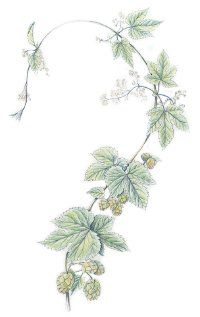The Pilgrims brought hops to Massachusetts, and its cultivation quickly spread through the colonies to as far south as Virginia. Hops can be grown as a garden plant and, like the grape, it's a quick-growing and quick-spreading vine. Most hops grown in the United States are used in the brewing of beer. Hops are also used for several herbal remedies, including digestive stimulation and relieving anxiety, insomnia and menopausal symptoms.
Uses of Hops
Hops are perhaps best known for their use as a bitter agent in brewing beer. But hops also are a nerve sedative and hormonal agent. Because they promote stomach secretions, bitter herbs are good digestive tonics. The bitter principles in hops are particularly useful for indigestion aggravated by stress or insufficient stomach acid and for gassiness and sour burping. Research has shown that hops also may help the body metabolize natural toxins, such as those produced by bacteria.
Advertisement
Hops contain plant estrogens, and women who harvest hops flowers for an extended time sometimes develop menstrual-cycle abnormalities. Its estrogenic constituents make this plant useful in treating menopausal complaints, such as insomnia and hot flashes.
You also may use hops for anxiety and nervous complaints or for indigestion and cramps resulting from anxiety. Use the tincture or tea before bed if you experience insomnia.
Keep reading to learn about warnings and preparation tips for hops, including instructions on how to make hops tea.
To learn more about treating common medical conditions at home, try the following links:
- For an overview of all of our herbal remedies, go to the main Herbal Remedies page.
- To learn more about treating medical conditions at home, visit our main Home Remedies page.
- One of the best things you can do for your health and well being is to make sure you are getting enough of the vital nutrients your body needs. Visit our Vitamins page to learn more.
This information is solely for informational purposes. IT IS NOT INTENDED TO PROVIDE MEDICAL ADVICE. Neither the Editors of Consumer Guide (R), Publications International, Ltd., the author nor publisher take responsibility for any possible consequences from any treatment, procedure, exercise, dietary modification, action or application of medication which results from reading or following the information contained in this information. The publication of this information does not constitute the practice of medicine, and this information does not replace the advice of your physician or other health care provider. Before undertaking any course of treatment, the reader must seek the advice of their physician or other health care provider.Before engaging in any complementary medical technique, including the use of natural or herbal remedies, you should be aware that many of these techniques have not been evaluated in scientific studies. Use of these remedies in connection with over the counter or prescription medications can cause severe adverse reactions. Often, only limited information is available about their safety and effectiveness. Each state and each discipline has its own rules about whether practitioners are required to be professionally licensed. If you plan to visit a practitioner, it is recommended that you choose one who is licensed by a recognized national organization and who abides by the organization's standards. It is always best to speak with your primary health care provider before starting any new therapeutic technique.
Advertisement
